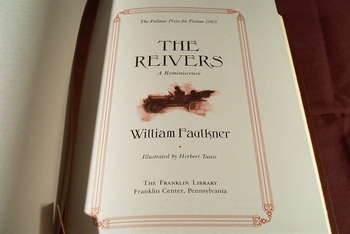Easton Press William Faulkner books
The Sound and The Fury - 100 Greatest Books Ever Written - 2004The Works of William Faulkner (10 volume set) - 1992 including titles:
The Sound and The Fury
Light in August
As I Lay Dying
Go Down, Moses
Intruder in the Dust
The Unvanquished
Absalom, Absalom!
The Reivers: A Reminiscence
Collected Stories, Vol. I
Collected Stories, Vol. II
The Works of William Faulkner (11 volume set) - 1998 including titles:
The Sound and The Fury
Collected Stories, Vol. I
Collected Stories, Vol. II
Light in August
As I Lay Dying
Absalom, Absalom!
The Reivers: A Reminiscence
Go Down, Moses
Intruder in the Dust
The Unvanquished
A Fable
Franklin Library William Faulkner books
A Fable - Pulitzer Prize Classics - 1976
The Sound and The Fury - Limited First Edition Society - 1976
Selected Letters of William Faulkner - Limited First Edition Society - 1976
The Sound and The Fury - 100 Greatest Masterpieces of American Literature - 1977
Absolom, Absolom! - 100 Greatest Masterpieces of American Literature - 1978
These Thirteen - Collected Stories of the World's Greatest Writers - 1979
A Light in August - World's Best Loved Books - 1979
Uncollected stories of William Faulkner - Limited First Edition Society - 1979
The Sound and The Fury - Greatest Books of the Twentieth Century - 1980
The Reivers - Pulitzer Prize Classics - 1983
Writer William Faulkner biography
Faulkner's literary career took off with the publication of his first novel, Soldiers' Pay, in 1926. However, it was the release of The Sound and the Fury in 1929 that brought him critical acclaim and established his reputation as a unique and innovative writer. This novel, with its stream-of-consciousness narrative and exploration of Southern aristocracy, marked the beginning of Faulkner's exploration of the fictional Yoknapatawpha County, a setting that would feature prominently in many of his subsequent works. Faulkner's writing often dealt with themes of race, class, morality, and the complex legacy of the Southern past. Notable works include As I Lay Dying, Light in August, and Absalom, Absalom! His ability to experiment with narrative techniques, including the use of multiple perspectives and non-linear timelines, set him apart as a modernist writer.
William Faulkner portrayed the decadence of the South in many of his novels and short stories, using for their background the environment of his youth in Mississippi. William Faulkner varied the stream-of-consciousness style of writing; instead of presenting his story completely through the reactions of an observer, he unfolded it largely by means of the flow of consciousness in the minds of the participating characters. The quality of Faulkner's novels The Sound and the Fury (1929) and Sanctuary (1931) won him a place among the major figures of contemporary American literature. He was elected to the American Academy of Arts and Letters in 1948 and received the 1949 Nobel Peace Prize for literature.
While Faulkner faced challenges early in his career, including financial difficulties and mixed critical reception, he gained recognition in the 1930s and 1940s for his contribution to American literature. In addition to the Nobel Prize, he received two Pulitzer Prizes for Fiction, and his influence extended beyond literature to film, where he worked as a screenwriter in Hollywood. Despite his literary achievements, Faulkner's personal life was marked by struggles and complexities. His relationships, including marriages and friendships, were often tumultuous. However, his dedication to his craft remained unwavering.
William Faulkner passed away on July 6, 1962, in Byhalia, Mississippi. His legacy endures not only through his novels and short stories but also through the impact he had on subsequent generations of writers. Faulkner's exploration of the Southern psyche and his innovative narrative techniques continue to be studied and celebrated in the realm of American literature.
The Reivers - A Reminiscence
One of Faulkner's comic masterpieces, The Reivers is a picaresque that tells of three unlikely car thieves from rural Mississippi. Eleven-year-old Lucius Priest is persuaded by Boon Hogganbeck, one of his family's retainers, to steal his grandfather's car and make a trip to Memphis. The Priests' black coachman, Ned McCaslin, stows away, and the three of them are off on a heroic odyssey, for which they are all ill-equipped, that ends at Miss Reba's bordello in Memphis. From there a series of wild misadventures ensues involving horse smuggling, trainmen, sheriffs' deputies, and jail.
The Sound and The Fury
The Sound and the Fury is a novel written by the American author William Faulkner. It employs a number of narrative styles, including stream of consciousness. Published in 1929, The Sound and the Fury was Faulkner's fourth novel, and was not immediately successful. In 1931, however, when Faulkner's sixth novel, Sanctuary, was published a sensationalist story, which Faulkner later claimed was written only for money, The Sound and the Fury also became commercially successful, and Faulkner began to receive critical attention.
The tragedy of the Compson family features some of the most memorable characters in literature: beautiful, rebellious Caddy; the manchild Benjy; haunted, neurotic Quentin; Jason, the brutal cynic; and Dilsey, their black servant. Their lives fragmented and harrowed by history and legacy, the character’s voices and actions mesh to create what is arguably Faulkner’s masterpiece and one of the greatest novels of the twentieth century.
Ever since the first furore was created on its publication in 1929, The Sound and the Fury has been considered one of the key novels of this century. Depicting the gradual disintegration of the Compson family through four fractured narratives, The Sound and the Fury explores intense, passionate family relationships where there is no love, only self centredness. At its heart this is a novel about lovelessness 'only an idiot has no grief; only a fool would forget it. What else is there in this world sharp enough to stick to your guts?'
Light in August
Light in August, a novel that contrasts stark tragedy with hopeful perseverance in the face of mortality, which features some of Faulkner’s most memorable characters: guileless, dauntless Lena Grove, in search of the father of her unborn child; Reverend Gail Hightower, a lonely outcast haunted by visions of Confederate glory; and Joe Christmas, a desperate, enigmatic drifter consumed by his mixed ancestry.
As I Lay Dying
As I Lay Dying is Faulkner’s harrowing account of the Bundren family’s odyssey across the Mississippi countryside to bury Addie, their wife and mother. Narrated in turn by each of the family members including Addie herself as well as others; the novel ranges in mood, from dark comedy to the deepest pathos. Considered one of the most influential novels in American fiction in structure, style, and drama, As I Lay Dying is a true 20th-century classic.
Go Down, Moses
Go Down, Moses is composed of seven interrelated stories, all of them set in Faulkner’s mythic Yoknapatawpha County. From a variety of perspectives, Faulkner examines the complex, changing relationships between blacks and whites, between man and nature, weaving a cohesive novel rich in implication and insight.
Intruder in the Dust
Set in the deep south that provided the backdrop for all of Faulkner's finest fiction, Intruder in the Dust is the novel that marks the final phase of its author's outstanding creative period. The chronicle of an elderly black farmer arrested for the murder of a white man and under threat from the lynch mob is a characteristically Faulknerian tale of dark omen, its sole ray of hope the character of the young white boy who repays an old favour by proving the innocence of the man who saved him from drowning in an icy creek.
The Unvanquished
Set in Mississippi during the Civil War and Reconstruction, The Unvanquished focuses on the Sartoris family, who, with their code of personal responsibility and courage, stand for the best of the Old South's traditions.
A Fable
This novel won both the Pulitzer Prize and the National Book Award in 1955. An allegorical story of World War I, set in the trenches in France and dealing ostensibly with a mutiny in a French regiment, it was originally considered a sharp departure for Faulkner. Recently it has come to be recognized as one of his major works and an essential part of the Faulkner oeuvre.
Absolom, Absolom!
Published in 1936, Absalom, Absalom! is considered by many to be William Faulkner's masterpiece. Although the novel's complex and fragmented structure poses considerable difficulty to readers, the book's literary merits place it squarely in the ranks of America's finest novels. The story concerns Thomas Sutpen, a poor man who finds wealth and then marries into a respectable family. His ambition and extreme need for control bring about his ruin and the ruin of his family. Sutpen's story is told by several narrators, allowing the reader to observe variations in the saga as it is recounted by different speakers. This unusual technique spotlights one of the novel's central questions: To what extent can people know the truth about the past?
These Thirteen
These 13 is a 1931 collection of short stories written by William Faulkner, and dedicated to his first daughter, Alabama, who died nine days after her birth on January 11, 1931, and to his wife Estelle.
These 13, Faulkner's first release of short stories, contained the following stories:
Victory
Ad Astra
All the Dead Pilots
Crevasse
Red Leaves
A Rose for Emily
A Justice
Hair
That Evening Sun
Dry September
Mistral
Divorce in Naples
Carcassonne



No comments:
Post a Comment
Share your best book review and recommendation